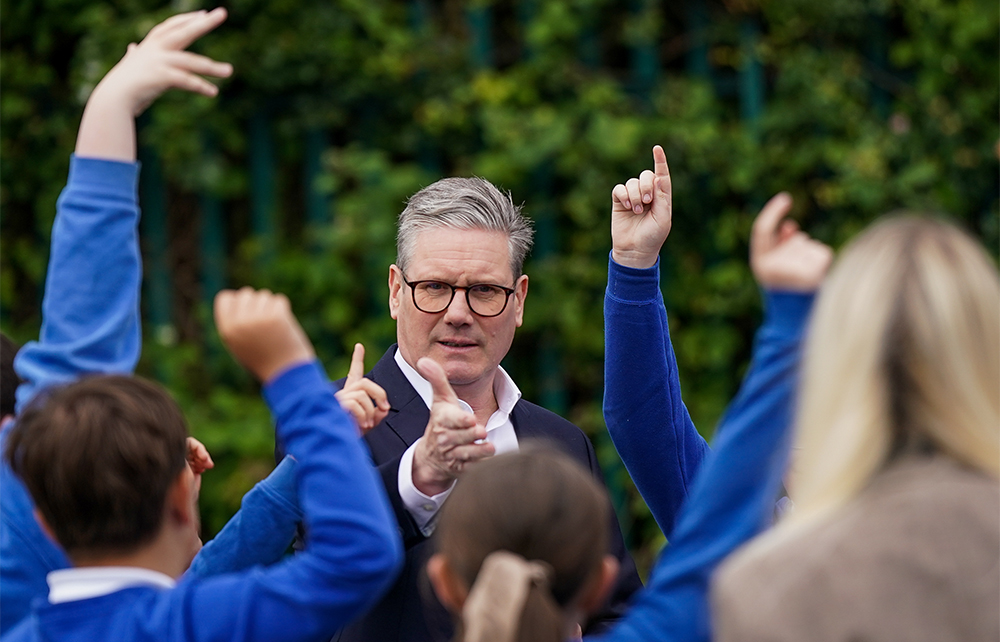Despite protestations from every quarter, Sir Keir Starmer will press on with his malicious plan to slap VAT on private school fees. I can only assume he’s doing this because he believes an excellent education, stemming from hundreds of years of tradition, is entirely undesirable.
Look, there’s no question about it. Our private schools are the cat’s pyjamas. They attract discerning parents from all over the planet, even from New York, that bastion of elitism, where bankers and lawyers duke it out to hire Juilliard grads to teach their four- year-olds the violin.
Recently, I met a financier from that city. So enamoured was he of London schools that he upped sticks and transferred his entire family. The spectre of an extra tax is as nothing to him. Ironically, many British families are now moving out of the UK so that they can send their offspring to private schools in other countries. Changing places, indeed.
Perhaps it is time to shelve that spanking new science block and use the wonga to keep fees affordable
The rest of the world marvels at the brilliance of our best schools: so why are our own leaders blind to it? Why does Starmer want to make it harder to choose a decent education? Aside from anything else, he’s way out of whack with public opinion.
A report this year by Civitas shows that 72 per cent of respondents believed that parents are right to use their own money to give their children the best possible start in life. That’s a much larger percentage of the population than those who voted for Starmer. The same report demonstrates that most people think private schools should do more in terms of bursaries for the poor, rather than be charged VAT. Entirely sensible! But hey, what does that matter, when you’ve got tradition to bash and a left-wing base to please?
What this means is that only the global super-rich will be able to afford the fees. Our finest educational resources will be splurged on the world’s future elite, while many of our own will miss out. This is desperately sad.
Most independent schools, from the tiny one down the road that charges £9,000 a year to the grand old alma maters, have close links to their communities, educating those who live near, providing employment, and sharing their facilities with local schools and organisations. What’s more, where the big schools will be able to make money from this VAT raid, claiming back capital expenses, the little ones, which can’t cut back on staff or bursaries, will lose out. These institutions are not hotels or Airbnbs for a deracinated plutocracy. Those gilded parental units will not emerge from their Rolls-Royces to be found sweating behind the tombola stall at the summer fair.
Aside from the fact that Starmer’s education tax will only raise enough money for slightly less than one extra teacher per state school, this destructive attitude towards private schooling will render him an outlier across the world, where 18 per cent of students in OECD countries attend a fee–paying school of some sort. Over in La Belle France, that fortress of socialism, you may be surprised to discover that 20 per cent of secondary students are educated at private schools of varying sorts, many of them affordable institutions which have an arrangement with the state. Long live egalité! You even get an (admittedly small) tax reduction. And quite right too: if anything, private school fees, as well as childcare, should be tax-deductible over here in Blighty. In neighbouring Germany, 9 per cent of all children (more than our much vaunted 7 per cent) attend private schools, which function with affordable fees thanks to parental associations and state subsidies. Yes, you read that right – the state subsidises private schools.
What about those rugged, democratic lands of the free, Australia and the United States of America? In the former, 36 per cent of children can be found adjusting their boaters every morning, and this number has been rising for decades. In the Grand Old US of A, it’s 12 per cent, and, dependent on the state you’re in, there are various financial vehicles available to help you pay for it: for example, you can store money in a trust, withdrawing it tax free to cover the cost of education.
Sweden, beloved of progressives, has a voucher system which enables a wider range of students to make use of private schools. Imagine, giving people a real choice! This voucher system has resulted in an uptake in pupils attending independent schools across Sweden, opening access to many children who otherwise would not have been able to go. Crucially, this happens without making it harder for anyone else.
Mention private schools in progressive circles, and someone’s bound to wag a finger in your face: ‘Actually, Finland banned private schools, and they have a really good education system.’ To this, I say two things: 2 per cent of schools in that country remain private (though they cannot make a profit); and can you name a famous Finn?
It must be said, though, that independent schools should do some soul-searching about their purpose. For the past two decades, the larger ones have entered into an arms race to attract the big bucks. Technology centres, nail-bitingly expensive facilities and so forth are now de rigueur. Long gone are the slightly shabby buildings of my youth. And since there seems to be no getting around this forthcoming raid on education – for let us call it what it is – perhaps it’s time to shelve that spanking new science block, and instead use the wonga to help keep fees affordable.
If independent schools want to survive, they must become available to families of all incomes. This will mean making some difficult choices. But even more so, it’s time that we looked around the world, before we lose what can’t be replaced.







Comments